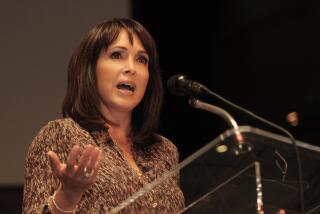MISSION VIEJO : Doing TV News From Ground Up
- Share via
News anchors Brenda Lee and Andrew Snavely exchanged cheery patter as they cut from a story about bears to one about a trip by fourth-graders to the ocean, only to turn serious when they talked about Iraq.
In another corner of the newsroom, reporters Tiffany DeProsperis and Sabrina Solanki edited videotape to be used for a Martin Luther King Jr. birthday feature.
Soon it would be time to head to music class, then to the playground for lunch.
The sixth-graders are part of Castille Elementary School’s broadcast news program, which has been producing biweekly newscasts since November. The programs are funded by a $12,000 grant from California Education Initiatives, a foundation of 10 corporations, and the shows are broadcast on the school’s closed-circuit television system.
“This is something that we have wanted to do for a long time,” said Principal Merle Smith. “The students are learning about a medium that is very important in their lives, and we are giving them some understanding about what goes into it. Secondly, they are learning oral communication and language skills and are learning what it takes to put together a polished, 30-second presentation.”
The entire school is involved. Sixth-graders are producing the show, with each class taking a turn. Fifth- and fourth-graders are reporters. Younger students are making “commercials” on such topics as tooth brushing and good nutrition.
“I learned you can’t just go on TV and talk,” said sixth-grader Amy Rademaker, 12, who helped produce the King birthday piece. “Who, what, when, why and where--you have to know these things and think about words that will sound good on TV.”
“You get to learn a lot about the things you’re reporting on,” said sixth-grader Danielle Vernengo, 11, who reported on a class’s bear project. “But mainly, it’s fun.”
Teachers Mike Morris, the program’s coordinator, and Deanna Maass said the program is a boon for their students, some of whom shine unexpectedly. One boy, for example, was a poor writer but an eloquent anchorman.
“You read his writing and it rambles and looks like chicken scratch,” Morris said. “But on TV, he sounded just like Tom Brokaw. We are going to have to reassess that child.”
Maass said it is giving the children a dose of reality.
“These kids watch a lot of television, but they don’t know what goes into producing a TV program,” Maass said. “Now they know it’s a lot of tough, tedious work.”
More to Read
The complete guide to home viewing
Get Screen Gab for everything about the TV shows and streaming movies everyone’s talking about.
You may occasionally receive promotional content from the Los Angeles Times.






